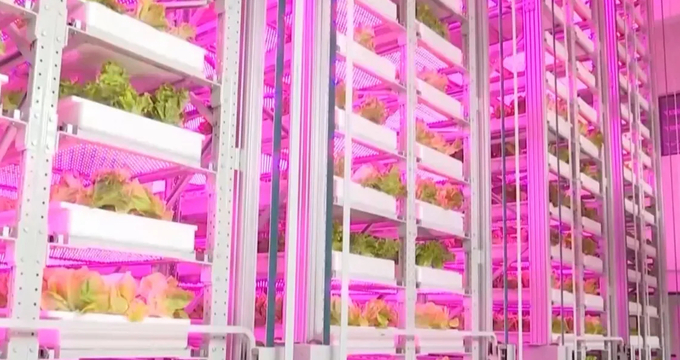May 30, 2025 | 10:40 GMT +7
May 30, 2025 | 10:40 GMT +7
Hotline: 0913.378.918
May 30, 2025 | 10:40 GMT +7
Hotline: 0913.378.918

China's vertical farm.
China has unveiled its first domestically developed unmanned vertical plant factory in Chengdu, Sichuan Province. Developed by the Institute of Urban Agriculture under the Chinese Academy of Agricultural Sciences, the 20-storied vertical farm is a first of its kind.
Vertical farming is often considered a promising and innovative approach to address certain challenges in agriculture. Allowing for the cultivation of crops in stacked layers, maximizes the use of vertical space.
This is particularly beneficial in urban areas where land is limited. It offers the potential to produce more food per square meter compared to traditional horizontal farming.
But in comparison to horizontal farming, there is the issue of plants getting an adequate amount of sunlight and water when crops are grown vertically. The team that developed this 20-storied art of specimen found a solution.
The team at the Institute of Urban Agriculture (IUA), Chinese Academy of Agricultural Sciences (CAAS) deployed robots that can grow and harvest a crop of lettuce in just 35 days, claim the researchers in a report.
This is possible due to an artificial intelligence-based control system. This control system utilizes advanced technologies and algorithms to monitor, analyze, and adjust key environmental variables within the vertical farming facility.
The facility utilizes advanced plant light formulas to improve light efficiency, overcoming challenges related to low light efficiency and high energy consumption.
"We can combine different amounts of red, blue, yellow, near-ultraviolet and near-infrared lights during different stages of the plant's lifecycle," said Wang Sen, a researcher at the IUA. "We have built a database of 1,300 combinations for 72 types of crops."
The vertical farming system enables year-round, continuous production of green food in multi-story structures, addressing issues like stable local food supply in urban areas and expanding cultivation in challenging environments.
With the ability to produce more than 10 harvests of green vegetables annually, the system enhances land utilization efficiency and conserves resources, providing a sustainable solution for future agriculture.
The research team led by Wang has found no significant difference between lab-grown plants and those from traditional farms. Indoor farms, with the ability to produce vegetables faster, are considered ideal for urban areas, wastelands, and deserts.
It also serves as a breeding accelerator, reducing the breed time of wheat, cotton, and soybean plants by at least 50 percent. The researchers are discussing with companies like Foshan NationStar Optoelectronics to commercialize their innovative vertical farming technology.
(interestingengineering)

(VAN) Vikas Rambal has quietly built a $5 billion business empire in manufacturing, property and solar, and catapulted onto the Rich List.

(VAN) Available cropland now at less than five percent, according to latest geospatial assessment from FAO and UNOSAT.

(VAN) Alt Carbon has raised $12 million in a seed round as it plans to scale its carbon dioxide removal work in the South Asian nation.

(VAN) Attempts to bring down the price of the Japanese staple have had little effect amid a cost-of-living crisis.

(VAN) Fourth most important food crop in peril as Latin America and Caribbean suffer from slow-onset climate disaster.

(VAN) Shifting market dynamics and the noise around new legislation has propelled Trouw Nutrition’s research around early life nutrition in poultry. Today, it continues to be a key area of research.

(VAN) India is concerned about its food security and the livelihoods of its farmers if more US food imports are allowed.